Posts Tagged ‘Megan Arkenberg’
Congratulations!
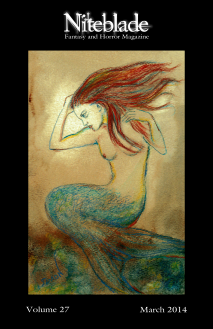 We are super proud to see several poems and one story from issue #27 of Niteblade show up on Ellen Datlow’s rec list for Best Horror of the Year (volume Seven)!
We are super proud to see several poems and one story from issue #27 of Niteblade show up on Ellen Datlow’s rec list for Best Horror of the Year (volume Seven)!
Megan Arkenberg, “Godfather”
Beth Cato, “Bird Girl” (poem)
Sandi Leibowitz, “Braiding” (poem)
S. Brackett Robertson, “The Dryad to the Woodcarver”
On a related note, Ada Hoffmann’s poem from that issue, The Mermaid at Sea World, has been accepted into Imaginarium: Best Canadian Speculative Writing.
So. Incredibly. Proud.
Congratulations, ladies!
Pushcart Nominations
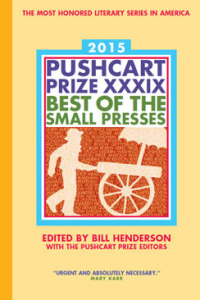 Nominating for the Pushcart Prize is always difficult. Picking six works from all Niteblade has published over the year? It’s freaking tough. If you think I’m exaggerating, take a look over our archives and try to choose the six works you’d nominate from four issues. See? Hard.
Nominating for the Pushcart Prize is always difficult. Picking six works from all Niteblade has published over the year? It’s freaking tough. If you think I’m exaggerating, take a look over our archives and try to choose the six works you’d nominate from four issues. See? Hard.
This year it was made even more tricksy by the fact I was nominating not only from Niteblade, but also A is for Apocalypse. Luckily for me, I had back-up.
Poetry editor Alexandra Seidel helped me out with the nominations this year. And when I say helped me out I mean she was invaluable and pivotal when it came to making our poem-based decisions.
So with no further ado… this year the Niteblade nominations for the Pushcart Prize are:
- The Bitter Gourd’s Fate by Anne Carly Abad (June 2014)
- Godfather by Megan Arkenberg (March 2014)
- Bird Girl by Beth Cato (March 2014)
Congratulations ladies, and good luck!
Niteblade #29: Porcelain Doll
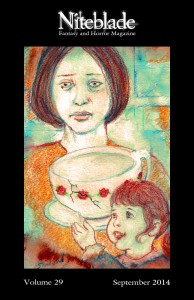 I am incredibly proud to announce the release of the September 2014 issue of Niteblade — Porcelain Doll.
I am incredibly proud to announce the release of the September 2014 issue of Niteblade — Porcelain Doll.
This issue (which is #29 for those of you keeping track at home), contains:
St. Winifred Medical Center, Abandoned by Joshua Gage
Shelba’s Brood by M.E. Garber
The Gate of Horn by Megan Arkenberg
Dancing with the Departed by Anna Zumbro
Porcelain Doll by J.A. Grier
There She Stands by Nathaniel W. Phillips
Awakened by Sandi Leibowitz
Lena’s Confession by Kristi Brooks
Valediction for the Dungeon Master by Mark Jones
The Crew by Doug Blakeslee
It’s a great selection. It’s interesting to watch how themes emerge from the slush pile and I feel like this issue has strong flavours of hauntings and love… and sometimes the both together.
You can preview all the stories and poems at our website — Niteblade #29: Porcelain Doll and if that intrigues you, pick up a downloadable copy at the Niteblade Store (which means we don’t have to pay anyone commissions) or, if you prefer, at the following third party websites:
Porcelain Doll at Smashwords
Porcelain Doll at Amazon
Porcelain Doll at Kobo
Issue #27: The Mermaid at Sea World
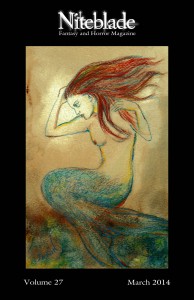 I always think each issue we produce is better than the last, and this is no exception. Issue #27: The Mermaid at Sea World is definitely one of the strongest line-ups we’ve ever put together. You’re going to love this one, I guarantee it!
I always think each issue we produce is better than the last, and this is no exception. Issue #27: The Mermaid at Sea World is definitely one of the strongest line-ups we’ve ever put together. You’re going to love this one, I guarantee it!
What if you had power over death? Or, if bleeding could transform you into something new altogether? From dryads to mermaids to lycanthropes to zombies, the stories and poems contained here offer musings on these creatures and much more. So sit down with a cup of tea, a warm blanket, and a book light—these tales will transport you to far-off fantasy worlds and into the forgotten corners of the darkest minds. It is Niteblade, where the strange and unusual lay down their roots.
Includes:
Bird Girl by Beth Cato
Godfather by Megan Arkenberg
The Dryad to the Woodcarver by S. Brackett Robertson
Hunt of the Damned by David Stegora
The Mermaid at Sea World by Ada Hoffmann
Crossing the Veil by Jamie Lackey
the queen’s pauper by Anna Sykora
You Kill Me by Milo James Fowler
Braiding by Sandi Leibowitz
Hold My Hand by K. A. Mielke
Niteblade Contributor Interview with Megan Arkenberg
Megan Arkenberg’s stories and poems have appeared in multiple publications. She’s a magazine editor too. I can’t help but think she’s somehow managed to add an extra ten hours into the day. You can visit her on the web at http://www.freewebs.com/meganarkenberg/.
When did you first recognize yourself as a writer?
I was in first grade. We were writing stories about superhero potatoes. My teacher was hard-core impressed by the phrase “as a tear rolled down her cheek,” which I must have
picked up from a book somewhere. That was the day I declared myself “good at writing.”
I didn’t become serious about being a writer until junior high, when we were required to take keyboarding classes. Suddenly, drafting stories stopped being a frustrating rush to record my ideas before I forgot them completely; for the first time, I could get words on “paper” as quickly as they sprung into my head. I’m sure I annoyed everyone around me with my insistence that I was an “author” and my lengthy descriptions of my novels-in-progress until my sophomore year of high school, when my stories finally started getting published.
Ironically, though learning to type was what made me confident about writing in the first place, I’ve recently returned to drafting with pen and paper—it forces me to slow down and pay attention to my sentences!
What draws you to speculative fiction?
Something’s a little screwy in my brain’s wiring, I think. It never comes up with ideas like “high school athlete loses scholarship after drunken party results in manslaughter charge.” No, it suggests things like “girl trains ravens to attack zombies,” or “woman is murdered on page 217 of an obscure poet’s biography.”
I also like the way secondary worlds can reject the historical second-class place of women, people of color, and people who live outside of accepted gender norms. Real Victorian women may have been encouraged to stay in the home, but there’s no reason my female steampunk hero has to put up with that kind of nonsense! Sometimes, I just want to enter a safe space, where I can play dress-up with historical settings without dealing with depressing historical mind-sets. Secondary world speculative fiction lets me do that.
Is there a piece of writing advice you’ve never followed?
I’ve never understood the general animosity towards adverbs. Some writers claim that all adverbs can be replaced by stronger verbs, but I think that’s nonsense. There’s a world of difference between “whispering” and “speaking quietly.” “Running” and “walking briskly” are two different actions. There is no good verb for “fiercely unhooking her necklace.” Of course, it is possible to use too many adverbs, just as it’s possible to use too many adjectives, or too many nouns. But stripping a story to the bare minimum of
adverbs isn’t always necessary or desirable.
In the September 2010 issue of Niteblade, Rhonda chose to publish your story, “Rosewinter“. Is there a story behind how it came about?
I read a story in an anthology—I don’t remember which, and to be honest, I’d prefer not to remember—about a girl who received a magical rose from her magical
adventuring lover every winter. This irked me incredibly. He’s off having marvelous adventures, and she (and the reader) is stuck at home, waiting for a silly rose! If they missed each other so much, why couldn’t she go adventuring with him?
That became the core idea of “Rosewinter”—why might one lover hide her adventurous life from the other? What dark secrets could that innocent gift, a winter rose, be hiding?
I wish I could remember where I got the idea for the braided chronology, past-present-past-present-future-present-future. I’ve always enjoyed playing with the way I tell my stories; this is most obvious in “Rosewinter” and in one of my other favorite short stories, “The Copperroof War.”
What have you been working on lately?
The combined influence of John Milton and the Book of Enoch has resulted in a lot of angel-and-demon stories recently. For some reason (I blame my screwy brain-wiring), these same stories also include a lot of heavy machinery: trains, wind turbines, warships and dirigibles. I also find myself writing more present-day stories, populated by people in jeans and tee-shirts instead of corsets and waistcoats, though most of these stories still have otherworldly settings—places ruled by tribes of zombies or metal angels, trains that run by themselves or hoard treasure like dragons.
Is there anything else you’d like to share with Niteblade’s readers?
I love getting feedback—I think most beginning writers do. Even if it’s just “funny story” or “I liked the part where the guy choked on a fishbone” or “I still don’t understand why Susan married the goldfish,” it tells me someone actually read and paid attention to the story. My e-mail address is markenberg@yahoo.com –I promise I don’t bite!
I’d also like to plug my two e-zines, Mirror Dance (fantasy of all flavors!) and Lacuna (historical fiction, alternate history, and speculative fiction with a historical setting).
Pushcart Prize Nominations
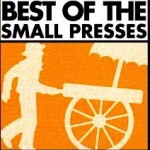 Niteblade is proud to announce our Pushcart Prize nominations, as chosen by Rhonda Parrish.
Niteblade is proud to announce our Pushcart Prize nominations, as chosen by Rhonda Parrish.
“The Marionette” by Jason L. Huskey (March 2010)
“My Own Ending” by Michael Fosburg (March 2010)
“Survivalist” by Kevin Brown (June 2010)
“Incense Sticks” by Ajay Vishwanathan (September 2010)
“Rosewinter” by Megan Arkenberg (September 2010)
“Love Affair” by Jacinta Butterworth (December 2010)
Congratulations to all our nominees. We wish you the very best of luck.